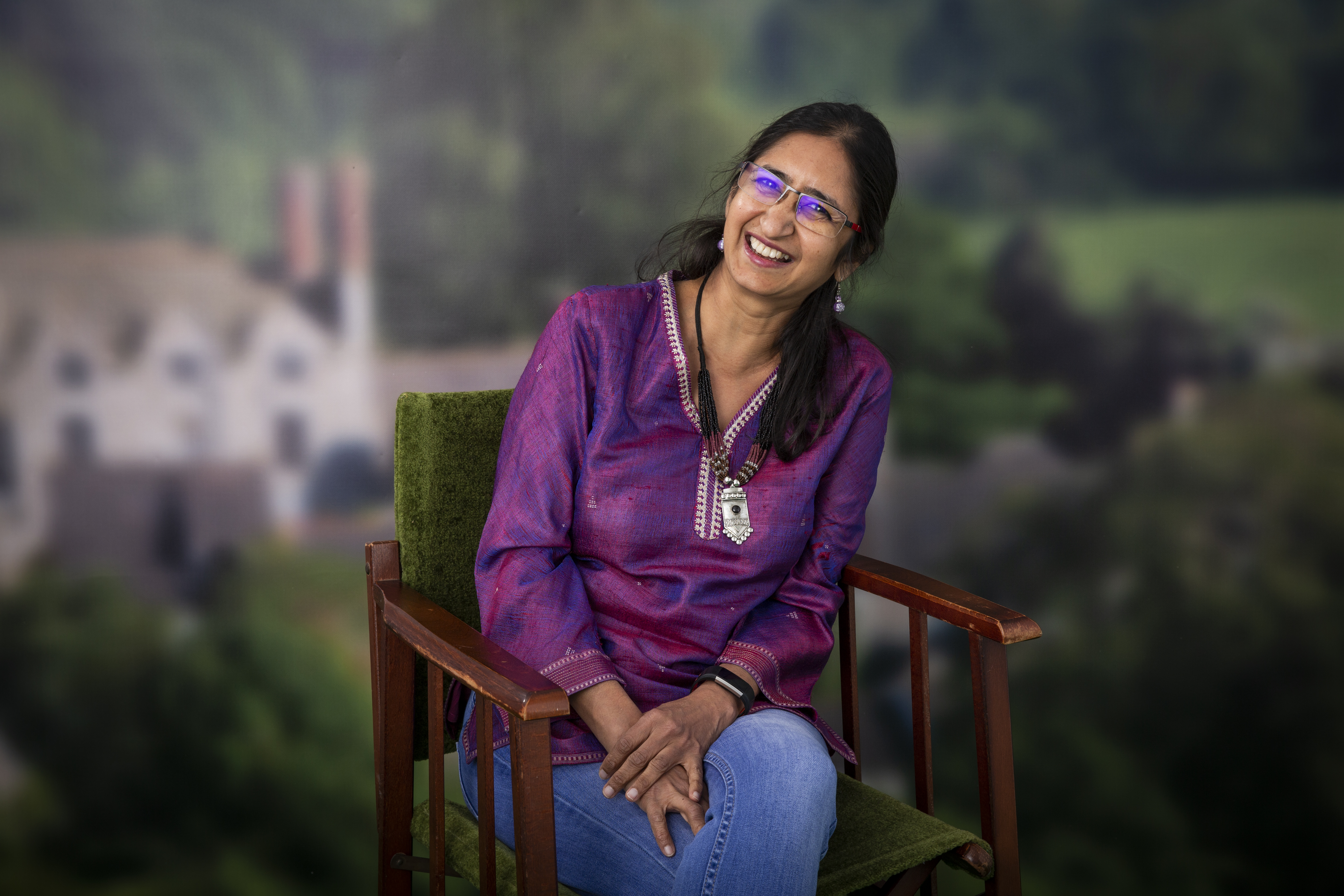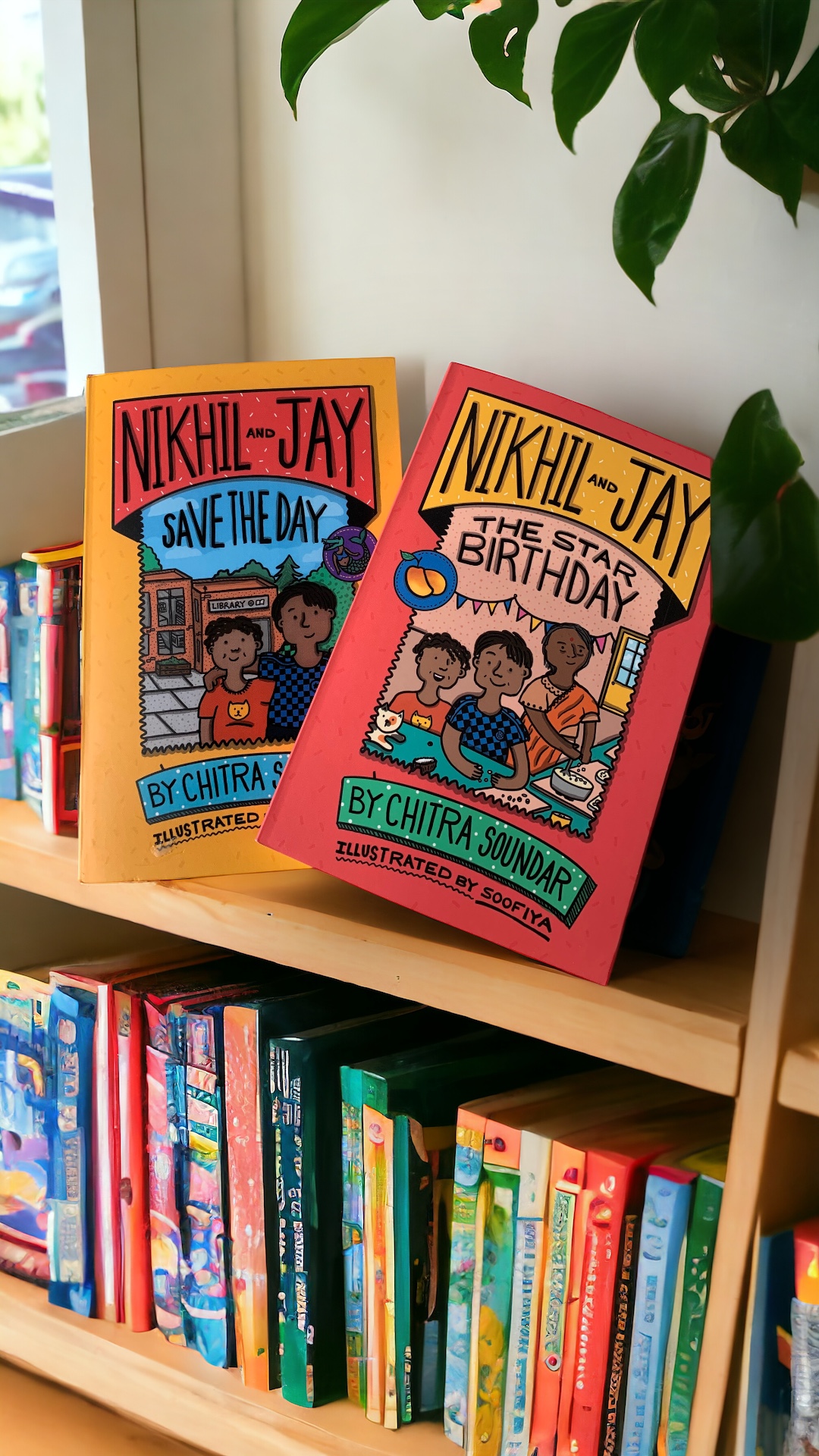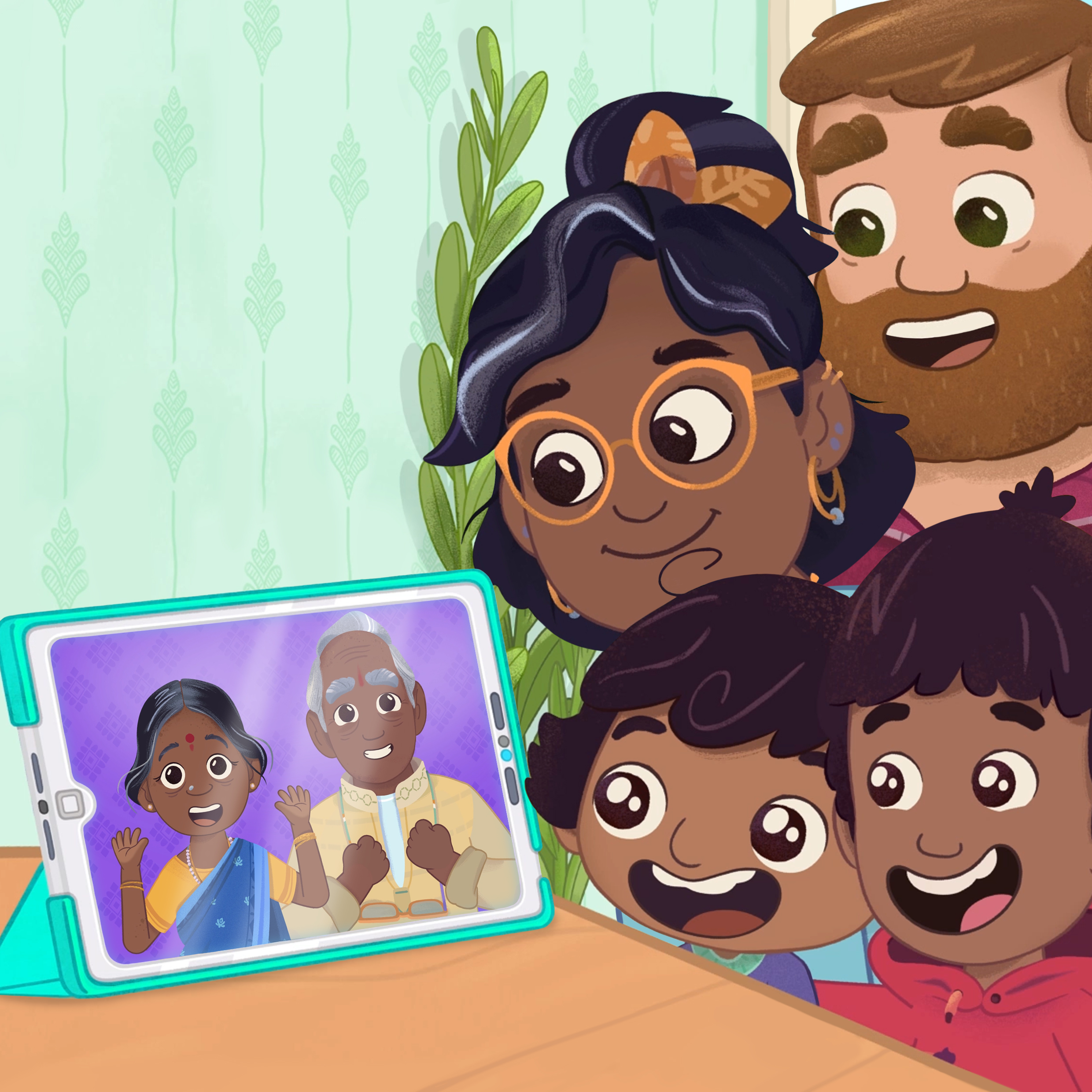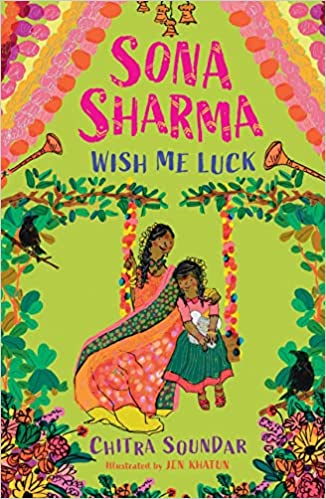The BBC recently announced the voice cast for the upcoming CBeebies animated sitcom ‘Nikhil & Jay’, a series that spotlights the adventures of two dual-heritage British Tamil brothers.
The sitcom is based on a series of young chapter books by Chennai Tamil author and storyteller Chitra Soundar, who told the Tamil Guardian in an interview, that "the show is going to be funny, culturally authentic, and showcase a really lovely blend of British and Tamil culture!"
The BBC recently announced the voice cast for the upcoming CBeebies animated sitcom ‘Nikhil & Jay’, a series that spotlights the adventures of two dual-heritage British Tamil brothers.
The sitcom is based on a series of young chapter books by Chennai Tamil author and storyteller Chitra Soundar, who told the Tamil Guardian in an interview, that "the show is going to be funny, culturally authentic, and showcase a really lovely blend of British and Tamil culture!"
The show is also supported by funding from CAKE Entertainment who will be distributing the show worldwide and Northern Ireland Screen.
Soundar, who also serves as one of the show’s executive producers, alongside King Banana TV and Paper Owl Films, is an internationally published, award-winning author of more than 60 children’s books. She creates picture books, fiction for young readers, and children’s digital media, including audio and TV. Her stories often draw inspiration from her personal experiences, Tamil heritage, South Indian folktales, and Hindu mythology.

Speaking to Tamil Guardian, Soundar shared that ‘Nikhil & Jay’ draws inspiration from her dual-heritage nephews.
“The family represented is very much like ours; we have Tamil grandparents, white grandparents, a white dad, and a Tamil mum,” she said. The concept originated as a picture book and evolved into a set of early chapter books before being adapted into an animated series. The initial idea was sparked by Soundar observing her nephews as they navigated the world, exploring their British and Tamil identities. She noted how her ‘Prince Veera’ series, which reimagines Indian folktales, helped them connect with their heritage.
“The boys didn’t have any books that represented them, and they were so taken in reading my books. Suddenly they had things they knew, like ghee and laddu and all the things in the books. And they just wouldn’t put the books down!”, Soundar explained.

Soundar delved into her motivation to ensure that ‘Nikhil & Jay’ remained true to her nephew’s story.
“Tamil is my culture; it’s more than a language. I am first Tamil, then Indian, then British. I didn’t want to make it “Indian” because what is Indian? We speak so many different languages, we eat different food, we wear clothes differently. So, I wanted to be super specific. It is about this family; I’m not representing every Tamil family in the world. This is this family, but through that, people can hopefully recognise their own experiences.”
After receiving feedback from the books, Soundar discovered that the series resonated with a wide range of readers, not only from various ethnicities across South India but also among individuals of dual heritage.
“I’ve taken the books into schools, and it’s not just Indian-English kids that are attracted to it. There are so many dual-heritage children in classrooms. Lots of kids who are from two different cultures put up their hand and talk about their grandparents being in a different country, speaking different languages, learning different foods, and celebrating birthdays differently. It creates this conversation in the classroom, so I’m hoping the books and the TV series will provide representation for all of those children.”
Transforming the books into an animated series, Soundar described her journey taking on the role of executive producer and plunging into the world of screenwriting.
“It was a completely new job to learn and for me, that was a good challenge to have. I learnt through watching and listening to other people, talking to other creators and learning from them by sharing our experiences. It’s been a steep learning curve but a wonderful opportunity,” Soundar said.
Exercising her creative control and with the support of the production, Soundar successfully preserved cultural authenticity by ensuring that the voice actors genuinely represented the animated characters on screen. “We wanted to cast everybody authentically, and we never wavered from that decision," Soundar stated.

7-year-olds Shiv Senthilkumar and Sai Ganesh Nadesan make their voiceover debuts as Nikhil and Jay respectively, who they proudly represent with their Tamil Heritage. The cast also features well-known actors from both Kollywood and Western cinema, including Charithra Chandran who voices Amma and Janaki Sabesh who voices Ammamma. In the BBC’s announcement of the voice cast, Charithra Chandran stated "It’s really wonderful to see a show like this on the BBC and to see my culture specifically represented. I never had anything like this when I was growing up.”
Soundar shared insights into her journey leading up to the BBC show. Leaving a successful banking career to become a full-time writer in 2018, Soundar emphasised how her previous experiences equipped her with essential skills for the creative industry.
“All the jobs you do, regardless of what they are, will teach you something. They are great ways to make connections and understand people, maybe even meet people who become characters in your stories! Every job will lead you to your passion if you are focused.”
Soundar noted how skills that she honed during her banking days, like networking, work ethic, and meeting deadlines, are now crucial in her writing career. She not only uses these skills for her personal development but is also committed to uplifting other budding writers. “All of the skills I learned are extremely useful now, especially as a person of colour entering the industry who has to navigate white spaces, not just for my own growth but also to build networks for other people of colour, so it’s easier for others. I connect people who are on the same experience as me or who want to do what I’m doing.”
She has also uplifted other South Asian writers by launching SAIL Fest, alongside Sinéad Gosai and Sanchita Basu De Sarkar. This festival celebrates South Asian children’s illustration and literature, bringing together the South Asian children’s book community from across the country.
Soundar's commitment to empowering South Asian writers is deeply rooted in her own struggles to bring authentic, culturally Indian stories to a predominantly Western publishing industry.
“When I started submitting and publishing in the UK, there weren’t many books about any child of colour. You end up thinking you have to write white stories about white children to get published,” she recalled. Through discussions with other writers of colour, Chitra realised that her unique perspective was precisely what made her stories both authentic and valuable.
“We just have to write the stories that we want to write and infuse honesty and authenticity and truth. I realised the most honest place for me to write from is my own frame of reference.” As she began crafting stories that reflected her personal experiences and cultural background, her work started to gain more traction. However, Soundar highlighted the barriers that still exist for writers of colour, even after successfully incorporating their culture into their work.
“They want you to write only Indian stories often, it’s very rare that they’ll ask for something completely different, which is a barrier. Especially when I was starting out, they definitely only wanted Indian stories from me!”
Chitra’s work is grounded in the belief that stories specific to one's culture can resonate universally. “We are in a world where people think stories about people of colour are only for people of colour, so they perceive the market to be smaller. But it’s our responsibility to show how universal they are, and you must be specific to be universal. If you don’t talk about your specific experience, you cannot be authentic and by being authentic a lot of people can relate to that regardless of their cultural background. It’s not a lesson, it’s not a virtue signal; I’m not saying you have to read inclusive books to be a wholesome individual. I’m saying ‘Hey, I come from this specific part of India and this is a story that is set in that part of India because I know this really well and I wanted to write a story about a girl just like me!’”

Soundar's journey was also marked by a deep internal conflict she explained to Tamil Guardian.
“I had kind of given up on being a traditional Tamil woman. I refused to get married, I left the country single and I’m not necessarily ceremonial or religious or ritualistic in any way. I had given up on all these things, some of which are critical to my culture. So, I thought what right do I have to write about my culture? That was my biggest conundrum – am I the right person to write about my culture?”
Despite this, Soundar is driven by a profound sense of responsibility and passion for storytelling. She stated, “If I don’t write it, who will?"
"Because there are very few South Indian Tamil writers in Britain, I predominantly grew up on Western literature. I was fascinated - what is a cove? What do you mean you ate a crumpet for breakfast? I had no idea what they were talking about, and therefore my imagination was bigger. I wanted to think outside my little space, and I was able to imagine these things. It allowed me to think of different places, different people and different cultures so I want the same for British children. Whether they are children of colour or white children, it is a disservice to all children if you don’t show them all of the world. Otherwise, they will turn out to be narrow-minded. For me, that is the biggest drive. To tell these stories that only I can tell - fascinating stories that I grew up with, my culture!”
Soundar's natural talent for writing, combined with her imaginative, creative nature has propelled her to success: “I can’t stop writing! It is not a hobby, it is not a job, it is a necessity!"
To buy any of Chitra’s books, click here or to learn more about Chitra and her work, visit chitrasoundar.com
